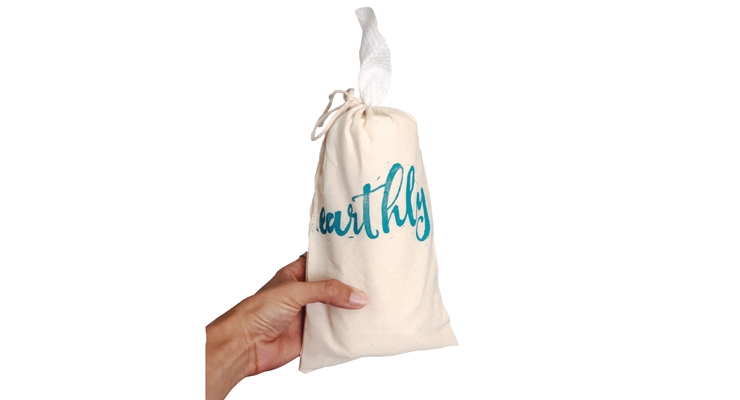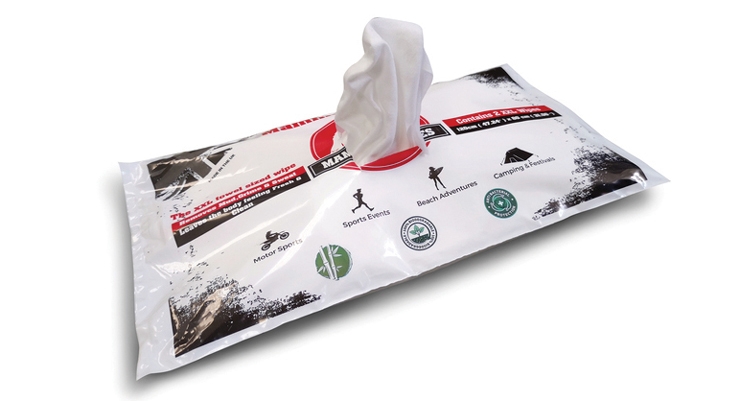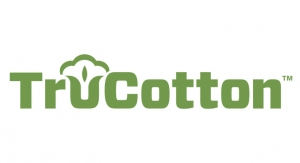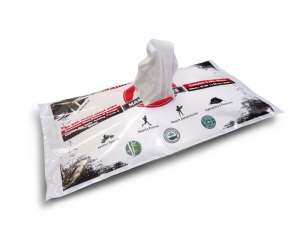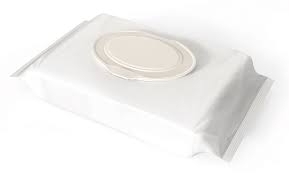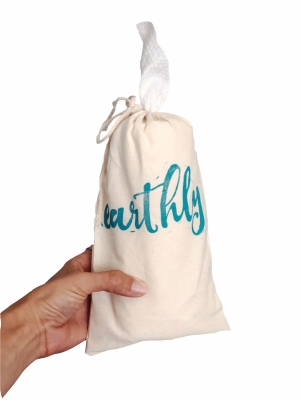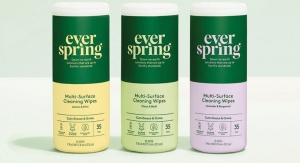Karen Bitz-McIntyre, Editor09.20.19
The impact of the Single Use Plastics Directive, which was adopted by the European Parliament last year, on the wipes industry will likely be significant during the next years. The directive seeks to significantly reduce the amount of single use plastics (SUP) going into European landfills by limiting the use of SUPs in certain categories and all out banning the use of certain SUPs like single use straws as the EU seeks to transition to a circular economy.
For the wet wipes —as well as filtered cigarettes and feminine hygiene items—the biggest impact will be felt in labeling requirements that need to inform consumers about the appropriate disposal of the product and about the negative impacts of SUPs and littering on the environment. Additionally, EU members will be required to develop awareness programs educating consumers on reusable alternatives to products containing SUPs.
Because this legislation is targeting Europe, Brussels, Belgium-based EDANA has been working overtime on the issue but North American-based INDA and its member companies are anticipating these efforts will also impact North America. While federal action is unlikely in the U.S., already more than 20 states as well as dozens of municipalities have introduced 100-plus bills concerning plastics. Probably the most ambitious is the California Circular Economy and Plastic Reduction Act, which seeks to significantly reduce the use of SUPs in packaging and products by 2030. This would be achieved through source reduction, recycling and composting.
As trade associations and other industry stakeholders try to gauge exactly what impact these regulations will have on the wipes and other nonwovens-related industries, companies throughout the supply chain are working to develop more green-minded products that will contribute to a circular economy and lessen their impact on already crowded landfills.
In June, Glatfelter, a maker of airlaid and wetlaid nonwovens for wipes applications, introduced an entirely plastic-free wipe with a greener footprint than similar products made using spunlaced and airlaid processes. Borrowing technology first used in its biodegradable tea bag business, Glatfelter’s new development for wipes is covalently bonded with 80% pulp and 20% cellulosic fiber but does not clump like conventional wetlace materials because of its 3D-integrated, textile-like fiber network. The bonding mechanism does not leave small microplastics behind after the pulp and cellulose degrade, according to Henning Röttger, director of innovation, CFBU. Additionally, the converting process is simpler, leaving less impact on the environment.
“The product does not lint, snag or scrape even on a rough surface so it is good for hard surface applications,” Röttger adds. “It is also good for baby wipes even though it is not quite as supersoft. We are finding more and more that consumers are putting sustainability above other needs in many markets. A growing percent of the population is considering sustainability.”
Speaking of consumer preferences, Jonathan Layer, business development manager, Americas, for Fibertex Nonwovens, surveyed more than 100 consumers to gauge how important natural products are and found that in the facial care category, 15% of people would pay up to a 15% premium for a natural product. In the surface cleaning market, the same people would pay up to 37% premium for recycled materials. Layer found that even the most price conscious consumers would pay up to 10% more for a natural cleaning wipe but were not willing to pay more for the facial wipe products.
On the subject of compostability, 85% of the respondents said having a compostable wipe was somewhat to very important and half of them said they actively composted waste or planned to start composting in the near future. “We also found that most of the people who would spend the money on natural products are generation Xers and the people who would not (the skeptics) were baby boomers,” Layer adds.
Industry Responds
While the industry needs to be cognizant of regulations concerning plastics globally and the drive toward the circular economy, many feel that the benefits of wipes and many other disposable products in the hygiene and healthcare area provide more benefits than harm.
“I don’t expect that the industry will trade consumer safety for sustainability,” Layer says. “It’s like medical wipes. They have a really valuable function and they are not going to stop using them in certain segments. That is going to slow it down.”
“With more than 200 municipalities putting some sort of plastic ban in place at the grassroots level, all the brands are making sure they have a strategy,” Layer adds. “ It might not be to totally get out of plastics but to be able to communicate why they have chosen what they chosen.”
According to Tracy Doucet, senior director research and engineering, Kimberly-Clark, sustainability is front and center at Kimberly-Clark because it is front and center for its consumers. “With environmental degradation more pointed and visible than ever before, sustainability is an increasingly important leadership imperative,” she says. “Our consumers, customers and employees alike are creating pull for initiatives like recyclable packaging and the use of sustainably sourced raw materials. This input directly feeds our multi-pronged approach for accelerating our journey toward more circular business models.”
Efforts include creating all packaging to be recyclable, reusable, or degradable; investing in development to utilize recovered or renewable materials, reducing overall reliance on petroleum-based feed stocks, incorporating principles of recyclability, degradability and secondary value of post-consumer waste where practical based on technology and infrastructure constraints; and developing business models to enable responsible management of its products after use.
In recent years, K-C has met its greenhouse gas (GHG) emissions reduction goal four years ahead of schedule, and the company is now doubling its target to reduce GHG emissions by 40% versus a 2005 baseline. Additionally, the company diverted 96% of its manufacturing waste from the landfill to higher value beneficial uses in 2018 and has diverted more than 20,000 MT of post-consumer waste via waste avoidance and recycling programs.
Another major wipes manufacturer, Clorox, has chosen to include disinfectant wipes as part of its participation in TerraCycle’s Loop pilot program which launched in the Mid-Atlantic region of New York, New Jersey, Pennsylvania, Maryland and Washington, D.C.
First announced at the World Economic Forum in January, Loop is an innovative sustainable shopping platform that enables consumers to purchase a variety of commonly used products from leading consumer brands in customized, durable packaging that is delivered in a reusable shipping tote. Once products are used, the packaging is collected, cleaned, refilled and reused.
“At Clorox, we are focused on Good Growth – growth that’s profitable, sustainable and responsible. Our participation in Loop’s pilot program supports this focus by enabling us to explore new circular models for our products,” says Benno Dorer, chair and CEO, The Clorox Company. “This also builds on our engagement with other TerraCycle programs that reduce waste and strive for innovative sustainable product solutions.”
Supply Side
The work of the brands could not be done without their suppliers and the companies that make the substrate material that goes into the wipes as well as the juice that goes on them, and they have already started thinking about how to eliminate plastics and make their offerings as sustainable as possible.
India’s Welspun launched spunlace materials made from cotton waste and recycled fibers this spring as it noticed that global sentiments for sustainable products were growing in all markets, and is particularly visible in disposable products like wipes and baby diapers.
“There is common belief among people that products developed using waste materials or recycled materials have comparatively poor and inconsistent functional properties; however Welspun’s latest innovation beats this perception to everyone’s surprise,” says Pranay Sahu, assistant vice president.
He adds that the products’ “green story” has generated buzz with many global brands, which has meant a quick commercialization timeline compared to previous nonwovens launches.
Also focusing its product development efforts on sustainability is Suominen, the world’s largest supplier of nonwovens to the wipes market. More than a decade after launching the Biolace product line—offering options for plastic-free, biodegradable and environmentally friendly nonwovens, the company introduced Biolace Sensation, a superior 100% renewable material option made from plant derived cellulose that is chemically modified, earlier this year.
“Bio-based products like this provide an alternative to conventional oil-based plastics and have certain benefits, such as lower carbon footprint, compostability as well as ability to biodegrade in certain natural environments,” CEO Petri Helsky says. “A similar product, Biolace Cozy is designed to be the softest and driest top sheet made from fully renewable fibers to take care of the consumer and the environment addressing the natural needs of female consumers.”
Helsky adds that Suominen supports the reduction of plastic pollution and is ready to cooperate with the industry to find mitigation solutions for this problem.
“We emphasize the important role of our products in modern society and therefore it’s also critical to promote consumer education on nonwoven products to avoid improper disposal methods and littering. It is also clear that we need to challenge ourselves to set more ambitious sustainability goals and plans for a better future. “
The Eye of the Beholder
While whether or not wipes are a convenience or a necessity, depends on who you ask, their role in consumers’ lives seems to be here to stay. Despite concerns over the environment and flushability, a high penetration rates and decreasing margins, the category continues to grow.
According to Smithers Pira, the global wipes market continues to grow more than 5% per year globally with increases being registered across all the major subcategories for wipes. As the wipes market continues to expand with new and unique applications, it is likely that more products based on natural ingredients or with a more sustainable lifecycle, will continue to appear on store shelves.
In developing its towel sized Mammoth Wipes, creators chose to use a sustainable, fully biodegradable bamboo material without the use of palm oils, hard chemicals or parabens. Designed to replace a shower, Mammoth Wipes feature a cutting-edge design which offers a hygienic and eco-friendly whole body refresh when traditional facilities aren’t available. Mammoth Wipes make it easy to clean up quickly without polluting the planet.
Mammoth Wipes are 25 times bigger than a regular face wipe and can be used by anyone spending a night under the stars, getting back to nature or roughing it out at a Tough Mudder or Spartan type event.
Mammoth Wipes are completely plastic free, have recyclable packaging and are fully biodegradable. Unlike smaller face and household wipe counterparts, a used Mammoth Wipe won’t contribute to the thousands of tons of landfill waste generated by similar products each year.
Jason Thorpe, director of Mammoth Wipes, says, “Standard wipes just aren’t up to the job of getting clean after an event like Tough Mudder or a day spent living it up at a festival. They also create big problems for the natural environment. Mammoth Wipes are totally unique, give a full body clean, can be used anywhere and aren’t harmful to the environment.”
Rochelle Serna, founder and CEO of Earthly’s Not Yet Wet Wipes, sought to develop a 100% pure wipe product to replace current offerings on the market. The result is a custom, soft, dry premium wipe made of 100% repurposed cotton blended fabric and was among the three finalists for this year’s World of Wipes (WOW) Innovation Award. Earthly’s Not Yet Wet Wipes is a dry wipe that can be used as a baby care product or a general cleaning tool, according to Serna.
“I definitely started out with a baby care product in mind and I would say that is the main market but this is a very versatile product. Not only is it sustainable but it can be used for many tasks on both skin and surfaces,” Serna says.”My main goal was for it to be as pure as possible.”
Originally, Serna set out to develop a wet wipe but after about a year of developing different formulations and hitting too many road blocks, she decided a dry wipe might be a more viable option. The result is a dry wipe that is made of repurposed cotton.
With a background in child wellness and family studies and a longtime proponent of clean nutrition, Serna became interested in the childcare market after she became a mother and saw a real lack of truly natural diapers and wipes in the market. She started her journey toward making a baby wipe by calling cotton farmers which eventually led her to Lawson Gary at T.J. Beall who educated her on the full process of turning a piece of cotton into wipe, and to Spuntech Nonwovens.
“(Lawson) was such a wealth of knowledge and he has really helped me understand this market,” Serna says.”And, Spuntech really treated me like family and worked with me on every challenge.”
Once the wipe was created, Serna’s next challenge was packaging. “I have a real problem with the fact that you have to throw a package away every time you use it—it means more garbage, use of more resources, etc,” she says. Instead, Earthly’s are packaged in a 100% cotton package that can be washed and hand dried and are shipped in plastic free shipping. “We try to eliminate waste in every part of the process.”
Speaking of wipes packaging, A Japanese company has developed the world’s first paper-based lid for wet wipes packaging. This development has the potential to eliminate as much as 80% of the plastics from wet wipes packaging, which is an important step in reducing the wipe industry’s contributions to landfill crowding. Each year, 14,000 tons of polypropylene waste is generated by flip-top lids of wet wipes packaging.
HasoCap is made of a special blend of cellulose fibers, which can maintain rigidity while also staying relatively thin. This composition also allows it to print well. It is manufactured to the tightest tolerances, providing consumers with an exact and precise closure system that closes with a distinct click.
According to Jonathan Bourget, principal of Apix Rex, a consultancy working with HasoCap, the cap is reaching the end of its business development phase and has been the subject of a number of customer trials as well as inquiries from all over the world. By next year, the company plans to be able to make 50 million pieces of the cap per month. The design can be dropped into existing production and packaging lines with minimal configuration changes. HasoCap can even use the same adhesive as plastic caps.
“The product responds to the conundrum that the wipes market was facing—their clients need to improve the environmental footprint by doing something visible,” Bourget says. “By replacing the plastic cap with something that can degrade while maintaining the premium look of the product, they are achieving this.”
Experts hope that reducing the percentage of wipes that go into the landfill will help protect wipes from upcoming legislation.
“Wipes are not necessity products when compared with other mass volume based disposable products like feminine hygiene items and diapers,” Welspun’s Sahu says. “Wipes are more convenience based products. Wipes are also becoming more and more visible clogging the sewer systems. Due to these reasons wipes are becoming easy targets by environmentalists and government agencies and we (nonwoven producers) being part of the supply chain need to take responsibility, and should develop sustainable products to fulfill consumer demands.”
For the wet wipes —as well as filtered cigarettes and feminine hygiene items—the biggest impact will be felt in labeling requirements that need to inform consumers about the appropriate disposal of the product and about the negative impacts of SUPs and littering on the environment. Additionally, EU members will be required to develop awareness programs educating consumers on reusable alternatives to products containing SUPs.
Because this legislation is targeting Europe, Brussels, Belgium-based EDANA has been working overtime on the issue but North American-based INDA and its member companies are anticipating these efforts will also impact North America. While federal action is unlikely in the U.S., already more than 20 states as well as dozens of municipalities have introduced 100-plus bills concerning plastics. Probably the most ambitious is the California Circular Economy and Plastic Reduction Act, which seeks to significantly reduce the use of SUPs in packaging and products by 2030. This would be achieved through source reduction, recycling and composting.
As trade associations and other industry stakeholders try to gauge exactly what impact these regulations will have on the wipes and other nonwovens-related industries, companies throughout the supply chain are working to develop more green-minded products that will contribute to a circular economy and lessen their impact on already crowded landfills.
In June, Glatfelter, a maker of airlaid and wetlaid nonwovens for wipes applications, introduced an entirely plastic-free wipe with a greener footprint than similar products made using spunlaced and airlaid processes. Borrowing technology first used in its biodegradable tea bag business, Glatfelter’s new development for wipes is covalently bonded with 80% pulp and 20% cellulosic fiber but does not clump like conventional wetlace materials because of its 3D-integrated, textile-like fiber network. The bonding mechanism does not leave small microplastics behind after the pulp and cellulose degrade, according to Henning Röttger, director of innovation, CFBU. Additionally, the converting process is simpler, leaving less impact on the environment.
“The product does not lint, snag or scrape even on a rough surface so it is good for hard surface applications,” Röttger adds. “It is also good for baby wipes even though it is not quite as supersoft. We are finding more and more that consumers are putting sustainability above other needs in many markets. A growing percent of the population is considering sustainability.”
Speaking of consumer preferences, Jonathan Layer, business development manager, Americas, for Fibertex Nonwovens, surveyed more than 100 consumers to gauge how important natural products are and found that in the facial care category, 15% of people would pay up to a 15% premium for a natural product. In the surface cleaning market, the same people would pay up to 37% premium for recycled materials. Layer found that even the most price conscious consumers would pay up to 10% more for a natural cleaning wipe but were not willing to pay more for the facial wipe products.
On the subject of compostability, 85% of the respondents said having a compostable wipe was somewhat to very important and half of them said they actively composted waste or planned to start composting in the near future. “We also found that most of the people who would spend the money on natural products are generation Xers and the people who would not (the skeptics) were baby boomers,” Layer adds.
Industry Responds
While the industry needs to be cognizant of regulations concerning plastics globally and the drive toward the circular economy, many feel that the benefits of wipes and many other disposable products in the hygiene and healthcare area provide more benefits than harm.
“I don’t expect that the industry will trade consumer safety for sustainability,” Layer says. “It’s like medical wipes. They have a really valuable function and they are not going to stop using them in certain segments. That is going to slow it down.”
“With more than 200 municipalities putting some sort of plastic ban in place at the grassroots level, all the brands are making sure they have a strategy,” Layer adds. “ It might not be to totally get out of plastics but to be able to communicate why they have chosen what they chosen.”
According to Tracy Doucet, senior director research and engineering, Kimberly-Clark, sustainability is front and center at Kimberly-Clark because it is front and center for its consumers. “With environmental degradation more pointed and visible than ever before, sustainability is an increasingly important leadership imperative,” she says. “Our consumers, customers and employees alike are creating pull for initiatives like recyclable packaging and the use of sustainably sourced raw materials. This input directly feeds our multi-pronged approach for accelerating our journey toward more circular business models.”
Efforts include creating all packaging to be recyclable, reusable, or degradable; investing in development to utilize recovered or renewable materials, reducing overall reliance on petroleum-based feed stocks, incorporating principles of recyclability, degradability and secondary value of post-consumer waste where practical based on technology and infrastructure constraints; and developing business models to enable responsible management of its products after use.
In recent years, K-C has met its greenhouse gas (GHG) emissions reduction goal four years ahead of schedule, and the company is now doubling its target to reduce GHG emissions by 40% versus a 2005 baseline. Additionally, the company diverted 96% of its manufacturing waste from the landfill to higher value beneficial uses in 2018 and has diverted more than 20,000 MT of post-consumer waste via waste avoidance and recycling programs.
Another major wipes manufacturer, Clorox, has chosen to include disinfectant wipes as part of its participation in TerraCycle’s Loop pilot program which launched in the Mid-Atlantic region of New York, New Jersey, Pennsylvania, Maryland and Washington, D.C.
First announced at the World Economic Forum in January, Loop is an innovative sustainable shopping platform that enables consumers to purchase a variety of commonly used products from leading consumer brands in customized, durable packaging that is delivered in a reusable shipping tote. Once products are used, the packaging is collected, cleaned, refilled and reused.
“At Clorox, we are focused on Good Growth – growth that’s profitable, sustainable and responsible. Our participation in Loop’s pilot program supports this focus by enabling us to explore new circular models for our products,” says Benno Dorer, chair and CEO, The Clorox Company. “This also builds on our engagement with other TerraCycle programs that reduce waste and strive for innovative sustainable product solutions.”
Supply Side
The work of the brands could not be done without their suppliers and the companies that make the substrate material that goes into the wipes as well as the juice that goes on them, and they have already started thinking about how to eliminate plastics and make their offerings as sustainable as possible.
India’s Welspun launched spunlace materials made from cotton waste and recycled fibers this spring as it noticed that global sentiments for sustainable products were growing in all markets, and is particularly visible in disposable products like wipes and baby diapers.
“There is common belief among people that products developed using waste materials or recycled materials have comparatively poor and inconsistent functional properties; however Welspun’s latest innovation beats this perception to everyone’s surprise,” says Pranay Sahu, assistant vice president.
He adds that the products’ “green story” has generated buzz with many global brands, which has meant a quick commercialization timeline compared to previous nonwovens launches.
Also focusing its product development efforts on sustainability is Suominen, the world’s largest supplier of nonwovens to the wipes market. More than a decade after launching the Biolace product line—offering options for plastic-free, biodegradable and environmentally friendly nonwovens, the company introduced Biolace Sensation, a superior 100% renewable material option made from plant derived cellulose that is chemically modified, earlier this year.
“Bio-based products like this provide an alternative to conventional oil-based plastics and have certain benefits, such as lower carbon footprint, compostability as well as ability to biodegrade in certain natural environments,” CEO Petri Helsky says. “A similar product, Biolace Cozy is designed to be the softest and driest top sheet made from fully renewable fibers to take care of the consumer and the environment addressing the natural needs of female consumers.”
Helsky adds that Suominen supports the reduction of plastic pollution and is ready to cooperate with the industry to find mitigation solutions for this problem.
“We emphasize the important role of our products in modern society and therefore it’s also critical to promote consumer education on nonwoven products to avoid improper disposal methods and littering. It is also clear that we need to challenge ourselves to set more ambitious sustainability goals and plans for a better future. “
The Eye of the Beholder
While whether or not wipes are a convenience or a necessity, depends on who you ask, their role in consumers’ lives seems to be here to stay. Despite concerns over the environment and flushability, a high penetration rates and decreasing margins, the category continues to grow.
According to Smithers Pira, the global wipes market continues to grow more than 5% per year globally with increases being registered across all the major subcategories for wipes. As the wipes market continues to expand with new and unique applications, it is likely that more products based on natural ingredients or with a more sustainable lifecycle, will continue to appear on store shelves.
In developing its towel sized Mammoth Wipes, creators chose to use a sustainable, fully biodegradable bamboo material without the use of palm oils, hard chemicals or parabens. Designed to replace a shower, Mammoth Wipes feature a cutting-edge design which offers a hygienic and eco-friendly whole body refresh when traditional facilities aren’t available. Mammoth Wipes make it easy to clean up quickly without polluting the planet.
Mammoth Wipes are 25 times bigger than a regular face wipe and can be used by anyone spending a night under the stars, getting back to nature or roughing it out at a Tough Mudder or Spartan type event.
Mammoth Wipes are completely plastic free, have recyclable packaging and are fully biodegradable. Unlike smaller face and household wipe counterparts, a used Mammoth Wipe won’t contribute to the thousands of tons of landfill waste generated by similar products each year.
Jason Thorpe, director of Mammoth Wipes, says, “Standard wipes just aren’t up to the job of getting clean after an event like Tough Mudder or a day spent living it up at a festival. They also create big problems for the natural environment. Mammoth Wipes are totally unique, give a full body clean, can be used anywhere and aren’t harmful to the environment.”
Rochelle Serna, founder and CEO of Earthly’s Not Yet Wet Wipes, sought to develop a 100% pure wipe product to replace current offerings on the market. The result is a custom, soft, dry premium wipe made of 100% repurposed cotton blended fabric and was among the three finalists for this year’s World of Wipes (WOW) Innovation Award. Earthly’s Not Yet Wet Wipes is a dry wipe that can be used as a baby care product or a general cleaning tool, according to Serna.
“I definitely started out with a baby care product in mind and I would say that is the main market but this is a very versatile product. Not only is it sustainable but it can be used for many tasks on both skin and surfaces,” Serna says.”My main goal was for it to be as pure as possible.”
Originally, Serna set out to develop a wet wipe but after about a year of developing different formulations and hitting too many road blocks, she decided a dry wipe might be a more viable option. The result is a dry wipe that is made of repurposed cotton.
With a background in child wellness and family studies and a longtime proponent of clean nutrition, Serna became interested in the childcare market after she became a mother and saw a real lack of truly natural diapers and wipes in the market. She started her journey toward making a baby wipe by calling cotton farmers which eventually led her to Lawson Gary at T.J. Beall who educated her on the full process of turning a piece of cotton into wipe, and to Spuntech Nonwovens.
“(Lawson) was such a wealth of knowledge and he has really helped me understand this market,” Serna says.”And, Spuntech really treated me like family and worked with me on every challenge.”
Once the wipe was created, Serna’s next challenge was packaging. “I have a real problem with the fact that you have to throw a package away every time you use it—it means more garbage, use of more resources, etc,” she says. Instead, Earthly’s are packaged in a 100% cotton package that can be washed and hand dried and are shipped in plastic free shipping. “We try to eliminate waste in every part of the process.”
Speaking of wipes packaging, A Japanese company has developed the world’s first paper-based lid for wet wipes packaging. This development has the potential to eliminate as much as 80% of the plastics from wet wipes packaging, which is an important step in reducing the wipe industry’s contributions to landfill crowding. Each year, 14,000 tons of polypropylene waste is generated by flip-top lids of wet wipes packaging.
HasoCap is made of a special blend of cellulose fibers, which can maintain rigidity while also staying relatively thin. This composition also allows it to print well. It is manufactured to the tightest tolerances, providing consumers with an exact and precise closure system that closes with a distinct click.
According to Jonathan Bourget, principal of Apix Rex, a consultancy working with HasoCap, the cap is reaching the end of its business development phase and has been the subject of a number of customer trials as well as inquiries from all over the world. By next year, the company plans to be able to make 50 million pieces of the cap per month. The design can be dropped into existing production and packaging lines with minimal configuration changes. HasoCap can even use the same adhesive as plastic caps.
“The product responds to the conundrum that the wipes market was facing—their clients need to improve the environmental footprint by doing something visible,” Bourget says. “By replacing the plastic cap with something that can degrade while maintaining the premium look of the product, they are achieving this.”
Experts hope that reducing the percentage of wipes that go into the landfill will help protect wipes from upcoming legislation.
“Wipes are not necessity products when compared with other mass volume based disposable products like feminine hygiene items and diapers,” Welspun’s Sahu says. “Wipes are more convenience based products. Wipes are also becoming more and more visible clogging the sewer systems. Due to these reasons wipes are becoming easy targets by environmentalists and government agencies and we (nonwoven producers) being part of the supply chain need to take responsibility, and should develop sustainable products to fulfill consumer demands.”

